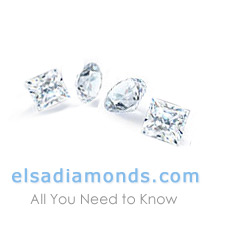
Which Diamond Grading Lab Is Best?
Certified Diamonds - the Big Three: GIA, EGL, AGS
There are lots of opinions in the jewelry industry about which grading lab is best when choosing a diamond.
How are diamonds certified?
The "Big Three" grading laboratories have similar processes for certifying diamonds. This process involves several Graduate Gemologists independently assessing and agreeing on the color, clarity, and carat weight of the diamond. This helps reduce the possibility for human error when determining the final grade for the diamond.
From a consumer standpoint the best approach to buying a diamond is to use your best judgment. Read the grading report from whatever lab certified the diamond and examine both the diamond and the certification. Use the certification as a rule of thumb and learn how the grading system works and decide for yourself which diamond is best for you.
About GIA, EGL, AGS Certification Labs
GIA - Gemological Institute of America
EGL - European Gemological Laboratory
AGS - American Gem Society
Recently, GIA seems to have the best reputation for grading diamonds accurately. Read more about GIA ![]()
![]()
EGL USA is one of the largest and oldest independent gemological institutions focusing on gemstone certification and research. Originally part of an international network founded in Europe in 1974, EGL USA opened its first U.S. lab in the heart of New York's international diamond and jewelry district in 1977.
In 1986 EGL USA became independently owned. Today the EGL USA Group has laboratories in New York City, Los Angeles, Vancouver, and Toronto.
EGL USA is not affiliated with any other EGL labs outside North America.
EGL USA's services are used by a broad range of customers:
- International diamond manufacturers
- Diamond dealers
- Mining companies
- Chain retailers
- Small independent jewelers
- E-businesses
- The public
AGS Lab has become very notable for their knowledge about cut and grading a diamond for its potential light performance.
Founded by Robert M. Shipley and several other leading jewelers and gemologists in 1934, the American Gem Society is a not-profit trade association of fine jewelers, jewelry, and suppliers in the United States, Canada, and some select international members. These members are dedicated to consumer protection, ethical business practices, and the development of superior gemological skills and knowledge.
Today the American Gem Society is comprised of nearly 7,000 retail, supplier, and individual titleholders, and affiliates worldwide. To maintain the educational standards of the membership, the Society requires its titleholders to update their gemological knowledge by passing an annual Recertification Examination. American Gem Society titles assure consumers that they are doing business with a knowledgeable and ethical businessperson.
Diamond Grading Lab recommendations
Get more involved in the diamond buying process and understand how the 4C's work, not just what it stands for. Ask to use a jeweler's loupe (eye piece) or a microscope to see the diamond under magnification.
Don't exclude comparing the color. The best way to do this is to see loose un-set diamonds and then refer to the certification to see what the grade is. In the end you need to see it with your very own eyes and trust your instincts about which diamond is right for you.
Diamond certification is certainly important to have and you shouldn't purchase a quality diamond without one. The healthiest decision is one that involves you referring to the certification and using your head.
Most importantly, don't forget the value of working with a reputable jeweler as well. A good jeweler lends his/her expertise and provides an unbiased opinion about each diamond's characteristics. The final decision about a diamond and whether it's right for you - should be made by you.

 Some time ago you both made a promise. A promise to each other. Now it’s time to recognise that you both meant that promise, and that now you both still mean it.
Some time ago you both made a promise. A promise to each other. Now it’s time to recognise that you both meant that promise, and that now you both still mean it.  Lady's and Gents 14K Wedding Bands
Lady's and Gents 14K Wedding Bands